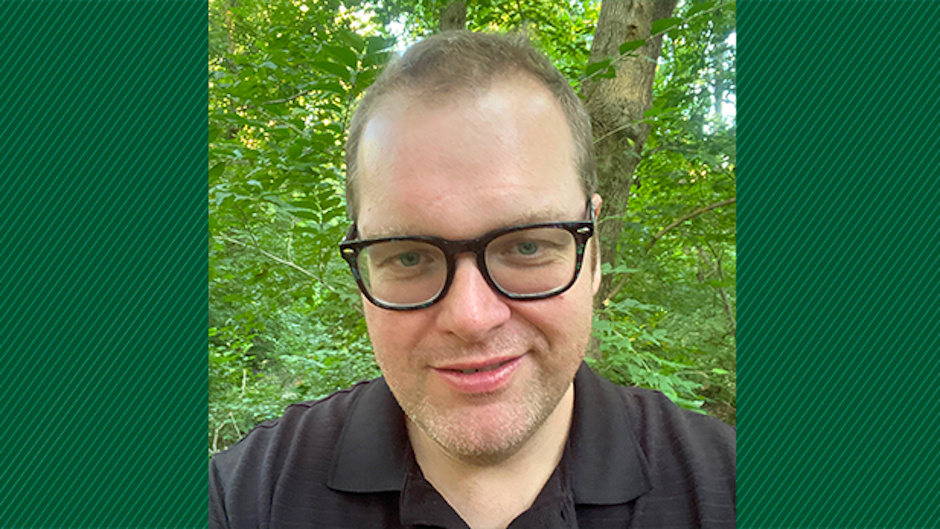Written by: ANASTASIA PIERIK
Environmental lawyer Andrew Carter, J.D. ’06, accepts that we will be engaging in an “existential fight” for the environment for the rest of his life. However, he feels it’s a battle that we just have to keep fighting.
Carter works as a Senior Conservation Policy Analyst at Defenders of Wildlife in Washington, D.C. Defenders is a national conservation organization dedicated to protecting imperiled species in North America and their habitats. Within the organization, Carter works at Defenders’ Center for Conservation Innovation, which creates solutions for problems in conservation governance by integrating science, technology, and policy.
Carter sees biodiversity loss as an especially critical problem, particularly because, unlike other environmental problems from which we can recover, once a species becomes extinct, we cannot bring it back, and its tens of millions of years of evolutionary history – or more – is lost. He argues that we have to fight against species extinction now, as there is no second round.
Carter’s initial career path did not involve wildlife conservation. Although he studied environmental policy at Hunter College in New York City, where he received his bachelor’s degree in Anthropology and Geography, he came to Miami Law because he was interested in solving problems generally and thought the program would prepare him well for policy work.
Regarding his law school experience, Carter most values the exposure he received to different areas of practice, allowing him to become a generalist on a number of legal issues, a useful skill in interdisciplinary policy work. After graduating from Miami Law, he worked in commercial, contract, and tort litigation, and later handled class action pension cases in New York.
Because Carter wanted to shift his focus to environmental issues, he decided to get his master’s in Marine Conservation and Policy from Stony Brook University while still working as a lawyer in New York. Interested in doing more research, he returned to the University of Miami to obtain his Ph.D. in Environmental Science and Policy. After completing his Ph.D., he worked as the Research Director at Miami Waterkeeper, a local nonprofit dedicated to protecting South Florida’s watershed, in a temporary grant-funded position, before moving to his current position at Defenders of Wildlife last year.
In his current conservation practice, Carter continues to use what he learned from law school courses that did not directly relate to environmental topics, ranging from financial accounting to business entities, and skills he gained post-graduation from litigating large, complex cases from beginning to end.
Carter loves his job, in which he is able to leverage his legal, policy, and scientific background to try to improve wildlife conservation governance, particularly under the Endangered Species Act. He does note that the current political climate has made conservation work more difficult, as the U.S. Fish and Wildlife Service has been revising ESA regulations in a way that many environmentalists argue are often “contrary to both the letter and spirit of the law.” For example, the FWS has not extended ESA protection to species that critically need protection even as their numbers plummet, and the Trump administration has tried to significantly weaken many implementing regulations under the Act.
One of the organization’s current projects involves the “30x30” Initiative, an international campaign to formally protect 30 percent of the planet by 2030. This campaign is premised on the fact that protected areas not only conserve biodiversity but also mitigate climate change impacts through natural carbon sequestration. Implementing such an initiative could be a critical step in addressing not only the current extinction crisis, but the climate change crisis as well.
The dedication, talent, and passion of Carter’s colleagues at Defenders of Wildlife inspires him to continue his invaluable work in a field that many would find too disheartening. He wants to use his education for a good purpose and is excited to work on these issues which, among other things, present an intellectual challenge he appreciates, and he is proud to help forward the mission of Defenders of Wildlife.
Yet, he acknowledges that he will probably be fighting for such environmental causes the rest of his life. “You pick your fights, and you fight them. If you win, great. You move on to the next. If you lose, that’s ok. You still move on to the next,” Carter said with a smile.
Carter hopes that Miami Law students recognize that environmental issues we have created, such as biodiversity loss, are some of the defining problems of our age and that there are many opportunities for lawyers to find solutions.
Read about Miami Law's environmental law program
Read about the HOPE Public Interest Resource Center

